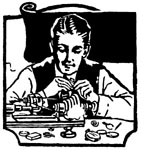
Do We Measure Up as Catholics?
WE MEASURE WHAT'S IMPORTANT
I am a management consultant in the field of new product development (NPD). I help companies improve their NPD operations by making them more competitive in the marketplace, improving the quality of their products, and improving the quality of life of their employees.
At the cornerstone of a lot of my work is a quote from a popular business management expert, Dr. Eli Goldratt: “Tell me how you measure me and I’ll tell you how I’ll behave.” His point is that measurements drive behaviors. When a company sets goals, it measures its progress toward those goals by reporting, for example, the increase or decrease in efficiency in certain areas of production. This act of measuring affects the way employees behave by emphasizing and rewarding the types of behavior that are likely to advance the company’s goals. And so, in a lot of my consulting work, I help companies eliminate measurements that drive behaviors that are opposed to NPD operational excellence, and put in place measurements that drive behaviors that increase NPD operational excellence.
What does this have to do with the Catholic Church, you ask. My oldest child will be attending high school next year, so my wife and I have been dutifully attending Catholic high school open houses in our area. At the most recent one we attended, there was a very professional slide-show presentation about the school, its mission, its activities, and its successes. As I sat there listening, I was struck by the fact that they were sharing their measurements of success. Well, for a guy who does measurements for a living, you can imagine my interest.
Here is what I learned at this Catholic high school. They began by emphasizing their religious heritage and the importance of religion in their curriculum and school life. But, they really had no measurements for this area which they claimed was so important. I often go into companies who tell me something is very important, and when I ask them how they are measuring this important value, they tell me they are not. So, lesson number one: If a Catholic high school tells you that religion is important and they are not measuring it, then it is not important to them.
Well, what did this high school measure? What was really important to them and many in their audience. There were a lot of slides on ACT scores: how they were above the national average and the local public school average, and how year by year their ACT scores have been improving. For years now, 98 percent of their graduates have gone on to college and obtained college degrees, so they needed a more precise measurement to differentiate themselves in the high school “marketplace.” So, they measured the percentage of graduates who went on to attend “big name” universities, such as Notre Dame, Harvard, Yale, Stanford.
You May Also Enjoy
The former period of tolerance toward Christians in Muslim lands is an exception, and the present attacks on Christians are the norm.
Fr. Ron Rolheiser says Jesus provides automatic forgiveness. Commit suicide if you want. Fr. Ron is giving you permission.
Oscar Andres Cardinal Rodriguez Maradiaga has opined, "I'm firmly convinced we are at the dawn of a new era in the Church, just as when Pope John XXIII opened its windows 50 years ago and made it let in fresh air."

